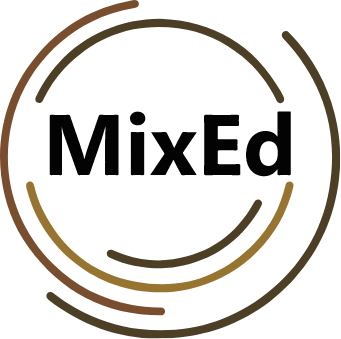By Louise Jaunbocus-Cooper
A fantastic session for our first in conversation with the 1%- we had 18 mixed race educators/allies on the meeting. My initial thoughts were- “phew/yay people logged on” …closely followed by… “Have I ever been around so many mixed-race people in my entire life? No!!!”. It was so nice to see people that were “like me”. Some looked a bit like me, most of course didn’t, but it was hugely comforting and immediately felt like a safe space.
So, what did we talk about and what did we learn? Here is a summary of the discussion and the contributions made by all.
- That 1hour 30minutes is not enough
- That we all have such different stories to tell on our journey to leadership.
- The one that was an imposter- using her “white-passing privilege” to stay under the radar, the guilt she feels, that only when she “made it” to the top, she started to bang the drum of anti-racism. How can we make sure people feel able to speak up early on in their careers?
- The one that never gave up- always working harder and often better (in terms of proven impact) but often overlooked for promotions that went to white, male colleagues. The intersectionality of gender and race.
- The one who felt the burden- that once you are at the table, it feels great, but you feel like you still have to conform, to sound like everyone else. When you make suggestions, you look like a troublemaker. The realisation that the institution is not willing to change, just appear more diverse. Those who look to you for leadership, see a “sell out” and so resentment burns. Leaving you isolated.
- The one who feels pride- that she is the one that will arrive at your school and be the face of her Trust. The first person to fill her role, never mind being female and mixed-race.
- How we can help to develop a better understanding of being mixed heritage and that it doesn’t look like one thing, sometimes it’s “unseen.”
- We agreed that Governance is key- to ensure diversity at the top is not just about senior leadership but governance too. Can anything really change until we change the racial makeup of those who appoint leaders?
Points that were submitted and we barely got time to discuss:
- Should we have to define ourselves? What do we call ourselves… should we have to explain why we define ourselves in the way we do? How do we respond to micro-aggressions- Where are you originally from? Your name is hard to pronounce. Great someone like you is in leadership…and so on.
- What about where other factors intersect – increasing age, disability, gender etc.?
- White people trying to work out how ‘black’ you are … are you loud (aggressive) strong, quiet, reserved, what are your “black characteristics” and how black are they? Who you chose as a partner often being a measure of your ‘blackness’.
- The same above but from black/brown people … almost like a constant ‘test’.
- Does all the above actually impede progression? Do we spend so much time navigating the above, that sheer fatigue and exhaustion leaves little room for ambition?
- Could there also be a degree of envy in some ways from both sides? We could be said to have more privilege than our black and brown peers are potentially able to occupy white spaces with less discomfort. White people perhaps envy the duality (or more) we have… ‘between camps’ as Paul Gilroy put it.
- Of the 1%, what are the retention rates? Are BAME staff that are mentored by BAME staff more likely to achieve success?
- What are the reasons BAME and Mixed Heritage people give for leaving an organisation? Those that cite discrimination – who follows up, if at all?
- Would mentorship of BAME and Mixed Heritage people by other BAME people in role. Will this help make the 1% bigger?
- How far does psychometric testing/traditional questions discriminate against those from other cultural backgrounds?
- How far does having an accent encourage prejudice despite that person often being probably able to read, write and speak multiple languages?
The discussion was so insightful and we now pose more questions than we have answer to…so the real work begins…
Thank you for co-hosting:
Shonagh Reid, Cassie de Gilbert, Sumeya Bhikhu, Marcus Shepherd
And thank you to the first founder-members of “The 1%”:
Ramon Mohamed, Claire Lotriet, Sharifah Lee, Julie Nisbett, Ki Dara, Azuraye Willaims, Claire Bale, Kat Rodrigues, Saira Ibrahim, Aimee Perkinson, Mumin Humayun, Camilla Small, Nazma Meah, Raj Unsworth, Edyta Ballantyne, Homaira Ibrahim, Esther Mustamu-Daniels.
Want to be a member of “The 1%”, get in touch.
